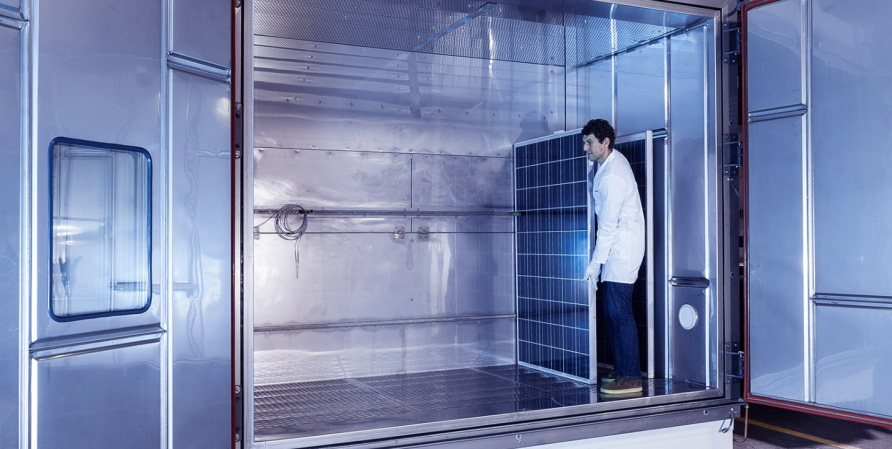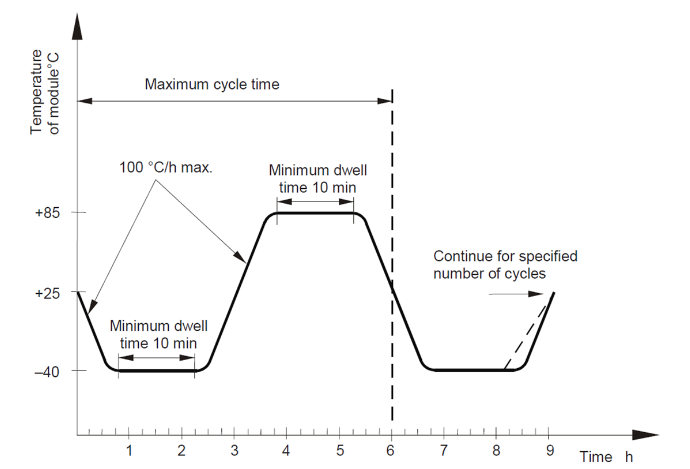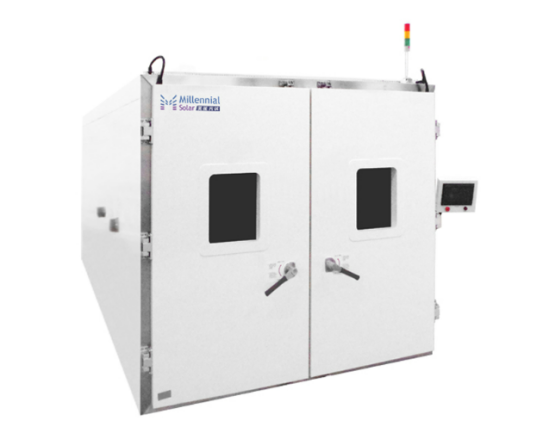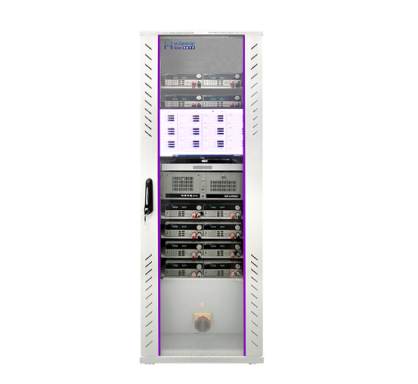
Quantum Efficiency Tester
PL/EL Integrated System
PV-Reflectumeter
3D Confocal Microscope
In-Line Four Point Probe Tester
Four Point Probe Tester
In-Line Thin Film Thickness Tester
Raman Spectrometer
FTIR Spectrometer
Spectrophotometer
Automatic Spectroscopic Ellipsometer
Contact Resistance Tester
Ultra depth of field 3D microscope
Auto Visual Tester
VMM PV Vision Measuring Machine
Solar Cell Horizontal Tensile Tester
Steady State Solar Simulator for Solar Cell
Solar Cell UV Aging Test Chamber
Solar Cell Comprehensive Tensile Tester
Visual Inspection Tester
Wet Leakage Current Tester
PV Module EL Tester
PV Module UV Preconditioning Chamber
Steady State Solar Simulator for PV Module
Current Continuous Monitor
Potential Induced Degradation Test
Bypass Diode Tester
LeTID Test System
Reverse Current Overload Tester
Impulse Voltage Tester
Hipot Insulation Tester
Ground Continuity Tester
Hipot Insulation Ground Tester
Damp Heat Test Chamber
Humidity Freeze Test
Thermal Cycle Test Chamber
Dynamic Mechanical Load Tester
Static Mechanical Load Tester
Hail Impact Tester
Robustness of Termination Tester
Module Breakage Tester
Cut Susceptibility Tester
Peel Shear Strength Tester
Universal Testing Machine (Single-arm)
Universal Testing Machine (Double-arm)
Glass Transmittance Tester
Acetic Acid Test Chamber
EVA Degree of Crosslinking Test System
Junction Box Comprehensive Tester
Drop ball tester
Semi-automatic scanning four-probe tester
Stylus Profilometer
Maximum Power Point Tracker
Perovskite Glass Transmittance Tester
Perovskite P1 Laser Scribing Multifunctional Testing Machine
Perovskite Online PL Tester
Perovskite Online Sheet Resistance Tester
Online Perovskite Film Thickness Tester
Perovskite Process Inspection Workstation
Portable IV Curve Tester
Portable EL Tester
Portable Thermal Imaging Tester
Solar Module Multi-Channel Testing System
PV Inverter Power Quality Tester
Drone EL Tester
IV Tester
IVEL Cell Sorting Machine
"Right-hand Assistant" for Reliability Testing - Thermal Cycle Environmental Test Chamber
Date : 11 October 2023Views : 915
Photovoltaic modules are the most important component of a photovoltaic power plant, and their reliability plays a vital role in the stability and lifespan of the entire system. Therefore, it is particularly necessary to conduct reliability testing of photovoltaic modules. One of the important assessment points for reliability is the thermal cycle test. In recent years, with global climate change, extreme weather conditions such as drought and high temperature have gradually increased, which has put forward higher requirements for the stability and performance of photovoltaic modules in harsh high-temperature environments. The thermal cycle environmental test chamber from Millennial Solar can easily test the performance of products when operating in high temperature areas for a long time.

![]()
Thermal cycle test
Thermal cycle testing is to determine the ability of photovoltaic modules to withstand thermal mismatch, fatigue, etc. caused by repeated changes in temperature. This test is very important for the reliability of the internal electrical performance connections of photovoltaic modules. The process of thermal cycle testing is to cycle the temperature of the photovoltaic module between (-40±2)℃ and (85±2)℃. The temperature change rate does not exceed 100℃/hour. Under the two extreme temperatures, it should be maintained at least 10 minutes. A cycle time generally does not exceed 6 hours, and 200 cycles are generally tested.
Thermal cycle test test process
The test is to apply a forward current to the photovoltaic module. The current is equal to the maximum power point current under standard test conditions, and the error is within ±2%. During this process, the current on and off of the module is monitored. After passing TC200, the photovoltaic modules will be inspected according to the following standards.
1. No current interruption during the test
2. No serious cosmetic defects as described below
①Broken, cracked, and outer surface detached
② The upper and lower covers, frames, and junction boxes have curved or irregular outer surfaces, which affects the installation and operation of photovoltaic modules.
③The crack area of the solar cell exceeds 10%
④ There are continuous bubbles or delamination on the edge or inside of the photovoltaic module
⑤ Loss of mechanical integrity, affecting the installation and operation of photovoltaic modules
![]()
Thermal Cycle Environmental Test Chamber

E-mail: market@millennialsolar.cn
Introduce:
Solar modules will withstand various harsh weather tests during their application. A test or process in which solar modules cycle materials or equipment at two set temperatures, usually with a higher rate of temperature change. It is defined as an environmental stress test. TC environmental simulation tests are used to verify and evaluate the reliability of photovoltaic modules or materials and to identify any manufacturing defects early through thermal fatigue-induced failure modes.
Fulfill the standard:
IEC61215-MQT11; IEC61730-MST51; requirements for equipment testing by third parties such as CNAS, TUV, and UL
Features:
Heating and cooling rate: -40℃←→+85℃, linear 3.3℃/min (heating and cooling rate is adjustable from 0~3.3℃/min)
Average power consumption: ≤100 KW·h (TC200 single cycle power consumption)
Reliability: Continuous trouble-free operation for no less than 4 months without downtime
Noise: A sound level ≤72dB (A), the noise value is measured at a distance of 1m from the front of the device and a height of 1m
Millennial Thermal Cycling Environmental Test Chamber is used with Current Continuity Monitoring System

E-mail: market@millennialsolar.cn
Millennial Current Continuity Monitoring System is specially developed for the 10.11 high and low temperature cycle test clauses and 10.12 humidity and freezing test clauses in the IEC61215 standard. It mainly includes providing stable DC power, current recording, temperature recording and temperature control functions. Through temperature control of the DC power supply, it can monitor multiple currents and temperatures in real time for a long time. Used in conjunction with the high and low temperature humidity and freezing test chamber, it can monitor the internal circuit continuity of multiple components. Determine the fatigue resistance of the material, the rationality of the lamination process, and the stability of the welding quality of the solar cell module in high and low temperature alternating environments.
The results of thermal cycle testing are critical to the design and operation of solar power systems. Through this test, we can evaluate the performance changes of photovoltaic modules at different temperatures and their reliability in long-term use. The thermal cycle environment test chamber owned by Millennial Solar can effectively test the ability of outdoor photovoltaic modules to withstand extremely high and low temperature harsh environments, thereby helping photovoltaic module manufacturers to supervise the production of photovoltaic modules

































































